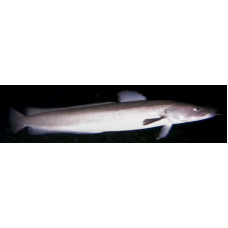Latin name
Molva molva
Other names
White lin, ling
Identification
These fish have an elongated body and a long head large mouth, which has large teeth, with the upper jaw projecting beyond the lower jaw, which bears an obvious sensory barbel. The chin tendril is longer than the diameter of the eye.
Features of fish fins
The pelvic fins are in front of the pectoral fins. The caudal fin is rounded. Two dorsal fins: the first has 13 to 16 and the second 59 to 70 soft rays, the anal fin has 57 to 66 soft rays.
Fish colouring
Back and head reddish brown, sides slightly lighter, belly yellow to white. Posterior parts of dorsal, anal and caudal fins are black with a pale edge.
Distribution
Lives in coastal areas of the eastern Atlantic Ocean from Scandinavia and Iceland to the Bay of Biscay, also in the North Sea and Skagerrak. Occurs in the western Mediterranean.
Habitat
Marine, benthic fish. Occurs at depths of 100 to 1000 m, usually 100 to 400 m.
Size
The length of these fish is up to 1.8 m, more rarely up to 2 m, the weight up to 45 kg.
Behavior
Lives near the bottom on rocky soils, does not form large clusters.
Food and feeding habits
Predatory, feeding on other fish (herring, cod, flounder) as well as large crustaceans, cephalopods and starfish.
Reproduction
Males become sexually mature in the 5th year of life with a body length of 80 cm and females in the 5-6th year with a body length of 90-100 cm. Spawning takes place from March to July at depths of 50 to 300 m at temperatures of 6-10 °C. A female lays between 6 and 60 million eggs. The eggs are pelagic with a fat droplet about 1 mm in diameter. The juveniles spend the first 3 years in the pelagial near the coast at a depth of 15-20 m and then move to deeper waters and adopt a benthic lifestyle.
Fishing
It is used in cooking, harvested using bottom trawls, gill nets and longlines.
| Classification | |
| Phylum | Chordata |
| Class | Actinopterygii |
| Squad | Gadiformes |
| Family | Lotidae |
| Genus | Molva |
| Species | M. molva |
| Features | |
| Conservation status | Least Concern |
| Habitat | Bottom |
| Life span, years | No information |
| Maximum body weight, kg | 2 |
| Maximum length, cm | 45 |
| Sailing speed, m/s | No information |
| Threat to people | Edible |
| Way of eating | Predator |
Common ling
Tags: common ling


